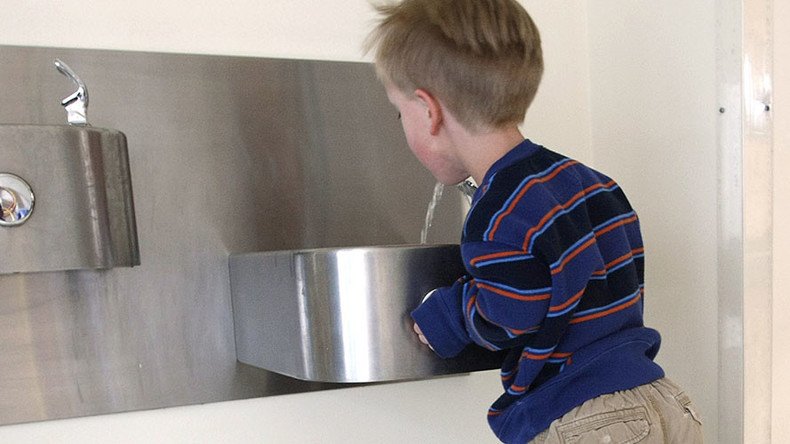High lead levels contaminating water fountains in Boston schools

Lead contamination in several Boston Public Schools water fountains included one case that measured higher than twice the national standard for an alert. The announcement came from partial results of lead testing conducted at 38 schools.
Five water fountains shut down Monday showed lead contamination at high levels in the Boston Public Schools district. Four were found polluted at Thomas J. Kenny Elementary School in Dorchester and one particularly dangerous fountain was found at Rafael Hernández School in Roxbury, Massachusetts.
"We’re testing the water in our schools and any water fountains that we find that there’s traces of lead in, we’re addressing the situation," Boston Mayor Marty Walsh said, according to WCVB. "We’re addressing it immediately. We have a plan now to go through all our schools.”
State law requires a minimum of one drinking fountain per 75 students in kindergarten, elementary and secondary schools.
"We have some old pipes that come into our schools and we have to go back and fix those pipes. We cannot have our kids drinking water that has lead," Walsh said, according to WCVB.
How is the Boston School Department preventing students from drinking lead in their water?https://t.co/LpwFJA7v2jpic.twitter.com/dDYBKtDxp0
— The Boston Globe (@BostonGlobe) March 29, 2016
The Hernández water fountain had a lead level of 32 parts per billion, over double the safety standard issued by the US Environmental Protection Agency.
The school district said it was making bottled water available to students and notifying parents last week about the test results. In addition, the district offered suggestions for where children could get tested for elevated lead levels.
"The district is committed to ensuring that students have access to clean, potable water in all of our schools. In the past, when the issue of lead in the public drinking water supply became a national health concern, BPS switched to bottled water across all schools,” said the Boston Public Schools in a statement.
At Kenny, three fountains tested at 18, 27 and 17 parts per billion before being flushed for 30 seconds. After that they tested at 14, 15 and 20 respectively, according to the Boston Globe.
‘Mind-boggling’: 17,000 New Jersey children to be tested for lead poisoninghttps://t.co/dyowCbpe5Cpic.twitter.com/yKQJm3DNeQ
— RT America (@RT_America) March 17, 2016
Diane Peck, a parent of two Kenny kindergarten students said the news provoked concern.
“As any parent would be when you hear of lead in the water, it is alarming,” Peck told the Boston Globe.
The school district said it plans to upgrade the plumbing in its schools to restore the fountains. Exposure to lead has been linked to lowered IQ and behavioral problems.
Michigan police tracking social media to keep tabs on Flint water crisis chatterhttps://t.co/LhC8eaf4stpic.twitter.com/CMgsGVmazI
— RT America (@RT_America) April 25, 2016
Lead testing gained new urgency in the wake of the lead crisis in Flint, Michigan, where municipal water supplies for 15 percent of the population contained lead at hundreds of times what is considered safe for drinking.
The findings come as the school system conducted tests at 38 schools, though results only include 26 schools so far, where annual tests were completed. Results for the remaining 12 schools have not been finalized.
3 Michigan officials charged over Flint water crisis as federal judge tosses $150mn lawsuit https://t.co/BN9rFAfEjLpic.twitter.com/0JPoKni57z
— RT America (@RT_America) April 20, 2016
Lead in water is measured in terms of parts per billion (ppb), literally floating particles of lead, detected in the water. If a test comes back with lead levels higher than 15 ppb, the EPA recommends that homeowners and municipalities take steps to reduce that level, such as updating pipes and putting anti-corrosive elements in the water.
The 15 ppb is a regulatory measure, not a public health recommendation. Because lead is poisonous, researchers say there is no absolutely “safe” level of the metal in drinking water, only acceptable levels.












